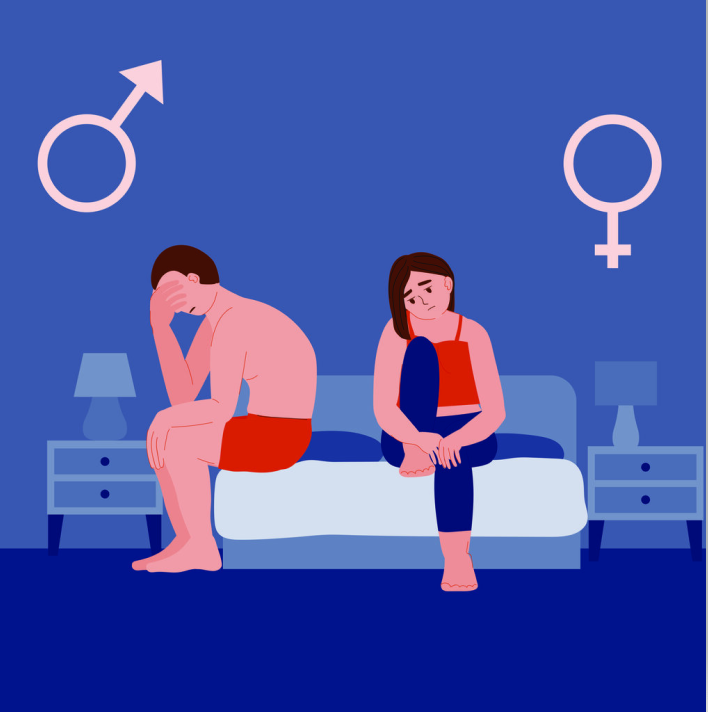What are the symptoms of sexual dysfunction?
Sexual dysfunction can affect various aspects of sexual activity and desire. Symptoms of sexual dysfunction can vary depending on the specific issue and may include:
- Decreased Libido: Reduced or lack of sexual desire or interest in sexual activity.
- Erectile Dysfunction: Difficulty achieving or maintaining an erection sufficient for sexual intercourse.
- Premature Ejaculation: Ejaculating sooner than desired during sexual activity, often before or shortly after penetration.
- Delayed Ejaculation: Difficulty or inability to ejaculate despite adequate sexual stimulation and desire.
- Anorgasmia: Difficulty achieving orgasm despite adequate sexual stimulation and desire.
- Painful Intercourse (Dyspareunia): Pain or discomfort during sexual intercourse.
- Vaginismus: Involuntary contraction of the vaginal muscles, making penetration difficult or painful.
- Reduced Sexual Arousal: Difficulty becoming sexually aroused, even with adequate sexual stimulation.
- Low Sexual Satisfaction: Reduced satisfaction or pleasure from sexual activity.
- Sexual Aversion: Avoidance or avoidance of sexual activity due to negative feelings or anxiety.
- Difficulty in Orgasm Control: Inability to control the timing of orgasm, leading to discomfort or dissatisfaction.
Sexual dysfunction can affect both men and women and may result from physical, psychological, or relational factors. If you or someone you know is experiencing symptoms of sexual dysfunction, consulting a healthcare provider or a specialist in sexual health can help determine the underlying causes and appropriate treatment options.
What are the causes of sexual dysfunction?
Sexual dysfunction can arise from a variety of physical, psychological, and relational factors. Here are some common causes:
- Physical Causes:
- Medical Conditions: Chronic illnesses such as diabetes, hypertension, cardiovascular disease, and neurological disorders can affect sexual function.
- Hormonal Imbalances: Imbalances in hormones, such as low testosterone in men or estrogen imbalances in women, can impact sexual desire and performance.
- Medications: Certain medications, including antidepressants, antihypertensives, and hormone treatments, can have side effects that affect sexual function.
- Substance Abuse: Alcohol, recreational drugs, and smoking can impair sexual performance and desire.
- Sexual Trauma: Past trauma or abuse can contribute to sexual dysfunction and affect one’s ability to engage in sexual activity.
- Psychological Causes:
- Stress and Anxiety: High levels of stress or anxiety can interfere with sexual arousal and performance.
- Depression: Depression can reduce sexual desire and pleasure, and affect overall sexual function.
- Body Image Issues: Negative self-image or low self-esteem can impact sexual confidence and desire.
- Performance Anxiety: Fear of not performing well sexually can create anxiety that affects sexual function.
- Relational Causes:
- Relationship Issues: Conflicts, poor communication, or lack of emotional intimacy with a partner can contribute to sexual dysfunction.
- Unresolved Conflicts: Disagreements or unresolved issues in a relationship can affect sexual desire and satisfaction.
- Lack of Trust: Trust issues or infidelity can impact sexual intimacy and performance.
- Lifestyle Factors:
- Fatigue: Exhaustion from work, caregiving, or other responsibilities can affect sexual desire and performance.
- Diet and Exercise: Poor diet and lack of physical activity can impact overall health and sexual function.
- Aging:
- Age-Related Changes: Natural aging processes can affect sexual function, including changes in libido, erectile function, and arousal.
Addressing sexual dysfunction often involves identifying and treating the underlying causes, which may require a combination of medical treatment, psychological therapy, and relationship counseling. Consulting a healthcare provider or a specialist in sexual health can help determine the appropriate course of action.
What is the treatment for sexual dysfunction?
Treatment for sexual dysfunction depends on its underlying causes and may involve a combination of approaches. Common treatment strategies include:
- Medical Treatment:
- Medications: For conditions like erectile dysfunction, medications such as sildenafil (Viagra), tadalafil (Cialis), or vardenafil (Levitra) may be prescribed. Hormone replacement therapy can address hormonal imbalances.
- Topical Treatments: Creams or gels for localized issues, such as lubrication for pain during intercourse or hormone creams for vaginal dryness.
- Addressing Side Effects: Reviewing and adjusting medications that may be causing sexual dysfunction as side effects.
- Psychotherapy:
- Cognitive Behavioral Therapy (CBT): Helps address negative thought patterns and anxieties related to sexual performance.
- Sex Therapy: Focuses on improving sexual knowledge, communication, and intimacy between partners.
- Couples Therapy: Addresses relationship issues, enhances communication, and improves emotional connection.
- Lifestyle Changes:
- Healthy Diet and Exercise: Improving overall health through diet and physical activity can enhance sexual function and desire.
- Stress Management: Techniques such as relaxation exercises, mindfulness, and meditation can help reduce stress and anxiety.
- Relationship Counseling:
- Improving Communication: Enhancing open and honest communication with a partner can resolve relational issues impacting sexual function.
- Addressing Intimacy Issues: Working through intimacy problems and improving emotional connection.
- Sexual Education and Techniques:
- Sexual Health Education: Learning about sexual function, arousal, and techniques can help individuals and couples improve their sexual experiences.
- Sexual Techniques: Techniques for managing issues like premature ejaculation or enhancing arousal and pleasure.
- Medical Procedures:
- Vacuum Erection Devices: For erectile dysfunction, devices that create a vacuum to help achieve and maintain an erection.
- Penile Implants: Surgical options for individuals who do not respond to other treatments for erectile dysfunction.
- Surgery: In some cases, surgical intervention may be needed to address physical issues causing sexual dysfunction.
- Addressing Co-occurring Conditions:
- Mental Health Treatment: Managing underlying mental health conditions like depression or anxiety can improve sexual function.
- Substance Abuse Treatment: Addressing alcohol or drug abuse can help restore sexual health.
Treatment plans are often tailored to individual needs and may involve a combination of these approaches. Consulting with healthcare professionals, such as a primary care physician, urologist, gynecologist, or sex therapist, can provide a comprehensive evaluation and personalized treatment plan.

Leave a Reply
You must be logged in to post a comment.